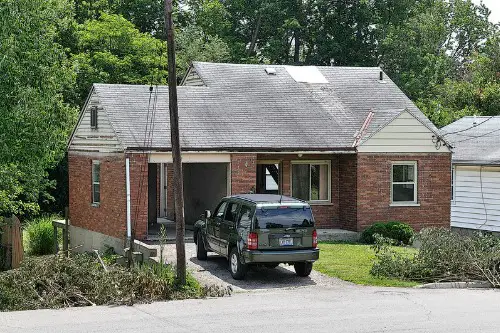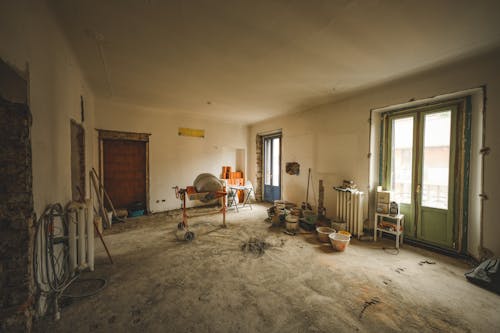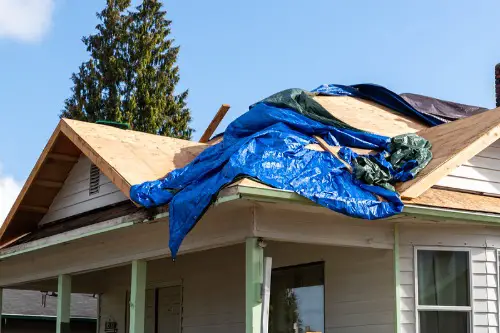1. “This one won’t last!”

This phrase is meant to stir up a sense of urgency—but don’t let it cloud your judgment. While some homes do go fast in competitive markets, agents often use this line even if the property has been sitting for weeks. It’s a psychological tactic known as FOMO (fear of missing out), designed to rush your decision-making. Always ask how long the property has actually been listed and whether there have been price drops.
In reality, if a home is truly flying off the market, a good agent should be showing you recent comparables to prove that. Without data to back it up, this could be a red flag. It’s worth checking the MLS history or asking your agent to pull it. Rushed decisions are expensive decisions in real estate.
2. “It’s got great bones.”

Translation? This place is probably a fixer-upper. “Great bones” usually means the structure is sound, but the cosmetic condition—or worse, the systems—may be lacking. It’s a euphemism that shifts attention away from all the costly things you might have to repair or replace.
A home with “great bones” might still need new wiring, plumbing, HVAC, or a roof. All those are major investments. So while the frame may be solid, the price tag to make it livable could soar. Always bring in a qualified inspector before getting swayed by this phrase.
3. “It’s a cozy space.”

Let’s be real—this almost always means it’s small. Realtors use “cozy” to sugarcoat cramped floor plans, low ceilings, or awkward layouts. Sure, cozy can be charming, but it’s often used to distract from the fact that your furniture may not even fit. It’s a word that tries to romanticize limitation.
If square footage isn’t listed clearly, ask for it directly. Photos can be misleading—wide-angle lenses make tiny rooms look larger. Walk through the space and measure rooms if you need to. Don’t let adjectives do the heavy lifting in your decision-making.
4. “The neighborhood is up and coming.”

This one walks a fine line. On one hand, it might be true—the area could be experiencing investment and growth. On the other, it may mean you’re buying into a location that lacks key amenities right now. You could be facing longer commutes, fewer grocery stores, or safety concerns.
Ask your agent to define what “up and coming” means specifically in this case. Are new businesses moving in? Are home values actually rising? Do some independent research into crime stats, school ratings, and development plans.
5. “You won’t find a better deal!”

Be cautious when you hear this superlative—it often comes with a catch. A “deal” could mean it’s priced low due to significant issues: a bad location, foundation problems, or serious repairs needed. It’s also subjective; what’s a deal for one buyer might be a burden for another. Price should be relative to condition, market trends, and your long-term goals.
Push for comps in the area to evaluate the statement. Sometimes agents say this to justify a price that’s actually just average or slightly underwhelming. Take the time to understand what’s influencing that “deal” label. It may not be as special as it sounds.
6. “Just needs a little TLC.”

This sounds innocent, right? But “TLC” is often code for repairs, updates, and major sweat equity. It might range from paint and flooring to full kitchen and bath overhauls. It’s vague on purpose.
Always ask what exactly needs attention. Don’t let someone else’s definition of “little” determine how much time or money you’ll spend. A home that needs work isn’t a bad thing—but be clear on the scope. Inspections are essential here.
7. “Priced to sell.”

This phrase can be accurate—but it’s often aspirational. Agents use it to suggest the listing is a bargain or competitively priced, even when it may not be. It’s a common way to create the illusion of a hot property. However, without local comps, it’s just noise.
You should always verify how the price compares to other homes in the neighborhood. A home priced “to sell” might actually be above market if the sellers are being optimistic. Or it could be low because it needs major work. Get clarity before assuming it’s a steal.
8. “As-is condition.”

This one is big. “As-is” means the seller isn’t planning to make any repairs or upgrades—what you see is what you get. That includes issues found during inspection. You could be on the hook for thousands in fixes with no leverage to negotiate.
It doesn’t always mean something is wrong, but you must approach with eyes wide open. Pay for a thorough inspection and know exactly what you’re getting into. Some buyers use this as a negotiation strategy, but others get burned. Ask your agent what the risks are in your specific situation.
9. “It has a lot of potential.”

This is another way of saying “you’ll need vision—and probably a budget.” Agents use this phrase when a home is outdated or in poor shape, but they want you to imagine the possibilities. The problem is, not everyone has the time, money, or patience to unlock that “potential.” It can also mask serious structural or cosmetic problems.
If you’re not looking to do major renovations, think twice. Dreams of “flipping” or “updating over time” can balloon into long-term projects. Be honest with yourself about your capacity for upgrades. And again, a solid inspection will help separate potential from pitfall.
10. “Motivated seller.”

This can be a double-edged sword. It might mean the seller is eager to negotiate, which could work in your favor. But it can also be a sign that something is wrong—like the house sitting too long, a divorce, or foreclosure looming. Either way, it’s a cue to dig deeper.
Don’t assume a “motivated seller” automatically equals a good deal. Ask your agent why they’re motivated and what that means for the deal structure. You may have more negotiating power—or be walking into a complicated transaction. The backstory matters here.
11. “Buyer to verify all information.”

This phrase is about protecting the seller and the agent—but it shifts the responsibility to you. It typically appears in listing descriptions or disclosures when details are vague or uncertain. For example, square footage, permits, or zoning could be unclear. While it’s standard legal language, it can also signal that not everything is nailed down.
It means you’ll need to do more homework. Pull records, check with the city, and don’t take anything for granted. You can’t sue later if the house isn’t what you thought it was based on the listing alone. That “verify all information” clause is a legal shield.
12. “Minimal maintenance yard.”

Sounds like a time-saver, right? But often, this is code for “tiny yard,” “all concrete,” or “no landscaping to speak of.” If outdoor space is important to you, don’t let this phrasing fool you. Minimal maintenance often equals minimal personality or usefulness.
Visit the property to see what this really means. You may find a postage-stamp patio when you were picturing a low-effort garden. “Low maintenance” isn’t a bad thing—but it should align with your expectations. Don’t let buzzwords stand in for actual space.
13. “Won’t last through the weekend.”

This is the cousin of “This one won’t last,” but even more aggressive. It’s a tactic meant to push you into skipping due diligence. Sometimes homes do go quickly—but the weekend warning is often thrown around to trigger emotional offers. It’s especially popular in seller’s markets where bidding wars are common.
Resist the pressure unless you’re absolutely ready. Make sure you’ve done your walkthrough, reviewed disclosures, and are comfortable with the numbers. A good agent should help you act quickly but wisely—not force your hand. The best deal is one you can live with long-term, not one you rushed into under pressure.
This post 13 Phrases Realtors Use That Should Set Off Sirens in Your Brain was first published on American Charm.


